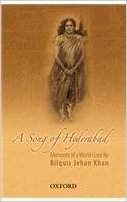While the grand narrative of South Asian freedom from the yoke of colonial rule and partition pays due deference to the tragedy of the loss of millions of lives and the largest human displacement in history in its aftermath, the implications of hundreds of princely states being sacrificed at the altar of the Indian Union is a largely untold tale. Personal accounts of how the upheavals impacted individual lives are scarcer still. It is in this context that Bilquis Jehan Khans A Song of Hyderabad: Memories of a World Gone By an endearing account of a womans life story from early upbringing in the Nizams dominions to cosmopolitan adulthoodmakes for a valuable addition to the body of South Asian literature. Bilquis was born into one of the socalled Paigah families, nobles of the senior Hyderabadi aristocracy owing their allegiance to the Nizam. Her maternal grandfather, Nasir NawazudDaula, was aidedecamp to the reclusive, eccentric and austere Mir Osman Ali Khan, seventh and last Nizam and reputedly the richest man in the world of his time.
Bilquis grew up in Nasir Manzil, a mid19th century mansion, as her maternal grandparents adoptive child, not knowing until the day of her marriage that her real parents were their daughter Moinunnissa and Moinuddin Khan, who in the latter part of his life renounced the privileges of nobility to become the Sufi pir Khwaja Nawab Niazi.

